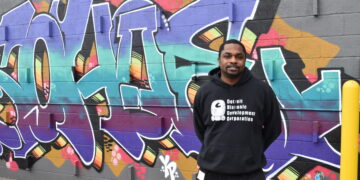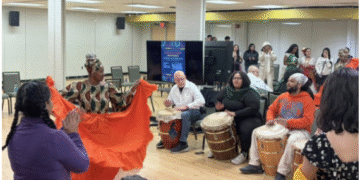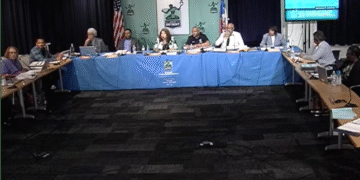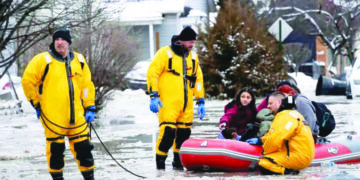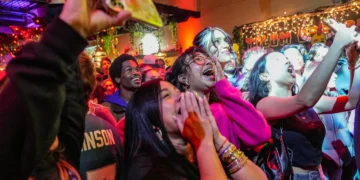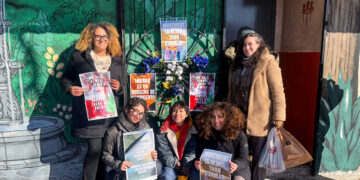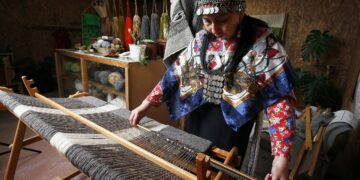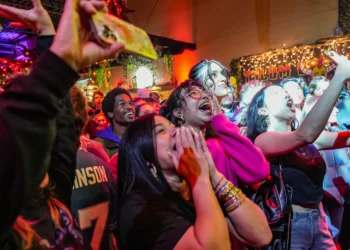Homicide, regardless of the victim’s gender, is a general term for murder.
Femicide, however, refers specifically to the murder of women by men because they are women—often involving sexual violence, brutality, or exploitation.
The disturbing nature of femicide makes it a difficult and often avoided topic by individuals and society.
Few crimes in human history have been as systematically ignored as the brutal murder of women by men. Women are the foundation of civilization and the essence of humanity. Women give life. They nurture, protect, and teach us to speak, pray, and distinguish right from wrong.
Recently, the theater company A Host of People brought Peregrina, a one-woman performance, to Southwest Detroit. Performed by Karilú Alarcón Forshee and co-created with director Sherrine Azab, this profound and sophisticated piece was presented in Spanish with English subtitles.

Their efforts produced a world-class performance, addressing femicide by honoring not only the names of victims but also the spirit of their hope and joy that existed before savagely cut short.
Though performed after Día de los Muertos, this piece was deeply rooted in the tradition of an Ofrenda—a profoundly emotional tribute to the women of Mexico lost to cruelty and injustice.
Between 1993 and 2011, more than 500 women were murdered in Ciudad Juárez, across from El Paso, Texas, exposing the brutal reality of femicide at the U.S.-Mexico border. (1)
For grieving families, even after their loss the horror continues as families seeking justice face a culture that routinely blames victims instead of perpetrators, with remarks such as: “It’s her fault for being there, for wearing those clothes.” This culture of victim-blaming perpetuates silence and impunity, as victims and families are stigmatized, and perpetrators remain unaccountable.
MSNBC provided a special segment where, noteworthy correspondent, Paola Ramos examined the heightened danger at the border of Matamoros and Brownsville. As border policies tighten, migrants are increasingly forced to return to dangerous conditions. Many cannot return due to threats of violence and must wait on the Mexican side of the border, where they are preyed upon by drug cartels and forced into sex trafficking. (2)
This is not just a problem in Mexico; femicide is a global epidemic. A United Nations 2021 report estimated that at least 45,000 women were killed worldwide in a single year—deaths classified as femicides. “Estimated” and “at least” imply that these numbers are far higher. (3)
In the U.S. and Canada, Native American women are disproportionately likely to go missing or fall victim to violence. According to the US Department of the Interior Indian Affairs, in 2016, there were 5,712 reports of missing American Indian and Alaska Native women and girls, but the central database called the National Missing and Unidentified Persons System only logged 116 of those cases. (4)
News reports, data, and art play a vital role in raising awareness. Performances like Peregrina help audiences illustrate the depth and impact of these injustices.

In Peregrina, women’s voices answered the question: What gives you joy? Every voice spoke of their hope — a creative life, love, and time with family. These are the values of humanity and of all civilizations. This is the spirit of women. Performance Art such as Peregrina not only raises awareness but inspires action, urging audiences to advocate for policy changes, support victims, and demand justice.
Men should attend and experience such performances, read related articles, or watch related documentaries. Men must take responsibility for their actions and their silence.
This is not solely a women’s issue; it is a societal issue. Men and women alike must confront the systemic causes of femicide and work together to create a world where all lives are valued equally.
References:
- Julia E. Monarrez Frargosa, An Analysis of Feminicide in Ciudad Juárez: 1993–2007, Strengthening Understanding of Femicide. PATH 2008
- https://media.path.org/documents/GVR_femicide_rpt.pdf
- MSNBC Paola Ramos reports to Alex Wagner: Sexual Violence increasing as criminal gangs’ prey on women trapped at the border.
- https://www.msnbc.com/alex-wagner-tonight/watch/sexual-violence-increasing-as-criminal-gangs-prey-on-women-trapped-at-the-border-207849541608
- United Nations on Drugs and Crimes: Gender-related killings of women and girls (femicide/feminicide) Global estimates of gender-related killings of women and girls in the private sphere in 2021 Improving data to improve responses.
- https://www.unodc.org/documents/data-and-analysis/briefs/Femicide_brief_Nov2022.pdf
- US Department of the Interior Indian Affairs: Missing and Murdered Indigenous People
- https://www.bia.gov/service/mmu/missing-and-murdered-indigenous-people-crisis
Resources:
- Insight Crime: Mexico’s Rising Femicides Linked to Organized Crime, by Lara Loaiza, 11 Jul 2023
- https://insightcrime.org/news/interview/mexicos-rising-femicides-linked-organized-crime-study-says/
- Failures by Mexican law enforcement aggravate rise in killings of women, Sarah Morland and Carolina Pulice, Reuter’s November 29, 2022
- https://www.reuters.com/world/americas/failures-by-mexican-law-enforcement-aggravate-rise-killings-women-2022-11-29/
- Vice News: The Femicide Crisis in the State of Mexico.
- https://www.youtube.com/watch?v=UB69VbhxmUk&t=784s


